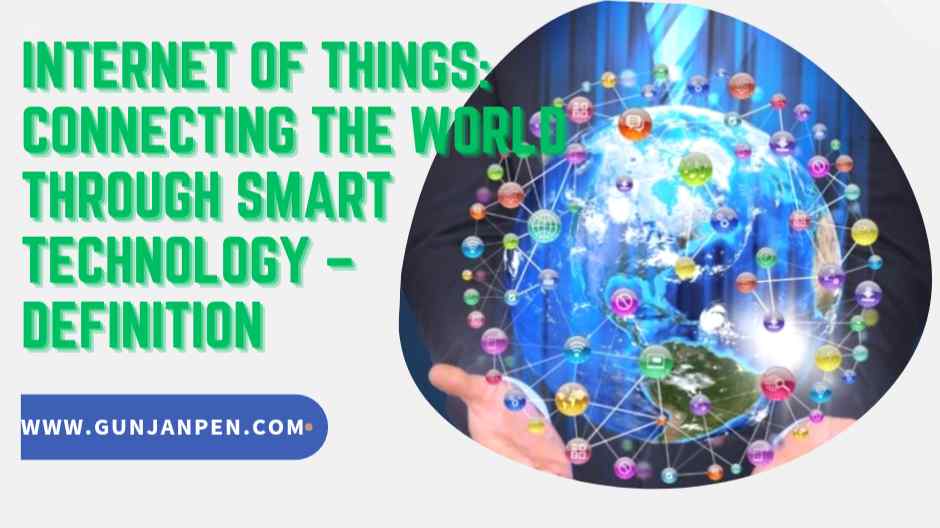Introduction
The world we live in today is rapidly evolving, and technology plays a crucial role in this transformation. One of the groundbreaking concepts that have emerged in recent years is the Internet of Things (IoT). This article delves into the essence of IoT, the impact of smart technology, and how it is revolutionizing the way we interact with the world.

Understanding the Internet of Things (IoT)
The Internet of Things The Internet of Things refers to the interconnection of various devices and objects through the internet, allowing them to collect, exchange, and analyze data. These devices can range from smartphones and wearable gadgets to household appliances and industrial machinery. The fundamental idea behind IoT is to create a network of smart devices that can communicate with each other, making our lives more efficient, convenient, and interconnected.
The Power of Smart Technology
At the core of IoT lies smart technology, which empowers devices to make intelligent decisions without direct human intervention. This ability enables them to adapt to user preferences, anticipate needs, and provide real-time insights. From smart thermostats that adjust the temperature based on weather conditions to self-driving cars that navigate through traffic, smart technology is reshaping the way we experience the world.
IoT Applications in Everyday Life
– IoT in Home Automation
Home automation has gained immense popularity with the advent of IoT. Smart home devices such as voice-activated assistants, smart lighting systems, and automated security cameras have become common, allowing homeowners to control and monitor their homes remotely.
– IoT in Healthcare
In the healthcare industry, IoT has led to the development of medical devices that can collect and transmit patient data in real-time. This data can be analyzed to improve diagnoses, monitor chronic conditions, and provide personalized healthcare solutions.
– IoT in Transportation
The transportation sector has seen significant advancements with IoT integration. Connected vehicles can communicate with each other and with infrastructure, leading to safer roads, reduced traffic congestion, and optimized fleet management.
– IoT in Agriculture
In agriculture, IoT sensors are used to monitor soil conditions, weather patterns, and crop health. This data-driven approach helps farmers make informed decisions, optimize irrigation, and enhance overall crop yield.
– IoT in Industrial Automation
Industries are embracing IoT to streamline processes and increase efficiency. IoT-enabled machines and sensors in factories allow for predictive maintenance, improved supply chain management, and enhanced production rates.
READ MORE: PS5 PRO: Lunch Date, Price, and Specs Leaked – All You Need to Know!
Benefits and Advantages of IoT
– Enhanced Efficiency and Productivity
With IoT, tasks that were once manual and time-consuming can now be automated, leading to increased efficiency and productivity across various domains.
– Improved Data Collection and Analysis
The vast amount of data generated by IoT devices provides valuable insights that businesses can use to make data-driven decisions and gain a competitive edge.
– Enhanced User Experience
Smart technology enhances user experience by tailoring services and products to individual preferences and needs, offering a more personalized and satisfying interaction.
– Cost Savings and Resource Management
IoT helps optimize resource utilization, leading to cost savings and a reduced ecological footprint in industries and everyday life.
– Increased Connectivity and Communication
IoT fosters seamless communication between devices, people, and systems, creating a highly connected ecosystem that enhances collaboration and information exchange.
Challenges and Concerns of IoT
– Security and Privacy Issues
As more devices become interconnected, ensuring the security and privacy of data becomes a paramount concern. Vulnerabilities in IoT systems could lead to data breaches and unauthorized access.
– Interoperability and Standardization
The lack of universal standards and interoperability protocols in the IoT landscape can hinder seamless communication between different devices and platforms.
– Power Consumption and Sustainability
The increased use of IoT devices raises concerns about energy consumption and the environmental impact, demanding sustainable solutions.
– Lack of Awareness and Education
Widespread adoption of IoT requires awareness and understanding of its potential benefits and risks. Educating the public is essential to address concerns and promote responsible usage.
The Future of IoT
The future of IoT is both promising and exciting. As technology continues to advance, we can expect even more innovative applications and seamless integration of IoT into our daily lives.
Conclusion
In conclusion, the Internet of Things (IoT) is revolutionizing the way we connect with the world. With smart technology paving the way for interconnected devices, IoT offers numerous advantages across industries and everyday life. However, addressing security, interoperability, and sustainability concerns is essential to unlock the full potential of IoT.
FAQs
Q1. How does IoT benefit the healthcare sector?
IoT in healthcare allows for real-time patient monitoring, personalized treatment plans, and improved medical decision-making.
Q2. Are there any risks associated with IoT adoption?
Yes, IoT adoption comes with security and privacy risks, which need to be addressed to ensure data protection.
Q3. What role does IoT play in home security?
IoT enables homeowners to remotely monitor and control security cameras, smart locks, and alarms, enhancing home security.
Q4. Can IoT improve agricultural practices?
Yes, IoT sensors help farmers optimize irrigation, monitor crop health, and make data-driven decisions to enhance agricultural practices.
Q5. What can we expect from the future of IoT?
The future of IoT holds tremendous potential for even more advanced applications, seamless integration, and improved user experiences.
Gillis, Alexander (2021). “What is internet of things (IoT)?”. IOT Agenda. Retrieved 17 August 2021.
- Internet of Things: Novel Advances and Envisioned Applications. Springer. p. 311. ISBN 9783319534725.
- Li, S.; Xu, L.D., eds. (2017). Securing the Internet of Things #lot
